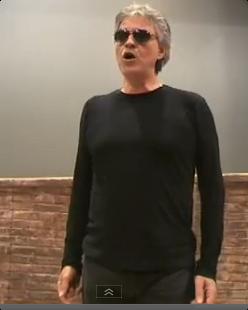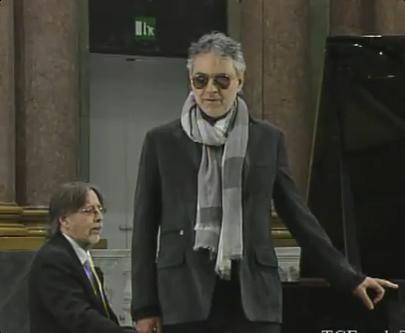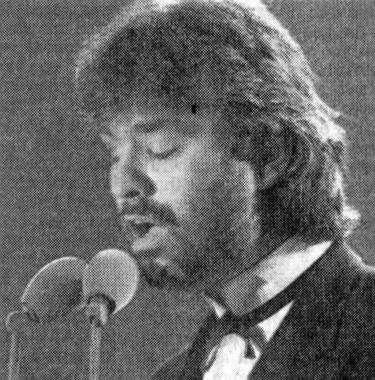Andrea Bocelli
born 22 September 1958 Lajatico
| The tenor of the future, no voice and a microphone, sorry two microphones. |
 |
 |
| Listen to my high register |
Andrea il bello |
Even Jorge De Leon is better
| Andrea Bocelli sings | La traviata: Libiamo, with Anna Netrebko
|
In RA format
| Andrea Bocelli sings | Il trovatore: Di geloso amor , with Ailyn Perez & Luis Ledesma
|
| What a technique!! |
In RA format
In RA format
In RA format
In RA format
I wish to thank Vladimir Efimenko for the recording (Di quella pira).
I was thinking about writing an article on the tenor
Bocelli when Daniel Ray Shaindlin published a well thought out piece on the artist on Opera-L.
He said very well what I was thinking, and here it is by permission of Mr. Shaindlin.
Subject: The antichrist a TENOR?
By Daniel Ray Shaindlin
It very well could be. For a while I thought it was John Tesh and Yanni but
now I think he is really among us. ANDREA BOCELLI. Something terrible has
happened. Pop "artists" have discovered what classical "artists" have known
for years. There is gold in them crossover hills! So while we've been
bitching about the Domingo/Denver, Pavarotti/Bolton cash cows, they snuck
up on us. The talent challenged have discovered that there are enough
untrained ears, enough "opera fans" with LOW standards (or NO standards) to
create a market for their assaults. First, let me say something about
standards. The great critic (universally recognized as one of the finest
writers on opera for what... 50 years?) Irving Kolodin once wrote about
Chaliapin. To paraphrase: he saw Chaliapin do Boris at the Met. Kolodin was
very young and he hated it. He thought it was a tired voice, an old man who
had once been better. Only later (as he tells it himself) did he realize
that at that time "he had no standards".
If only some of the public would recognize that!
A quick word about technique. There is this little thing in the throat
called the PHARYNX. It is the cavity connecting the nasal passages and
mouth with the esophagus. One can find references throughout the centuries
by the great voice teachers, admonishing students in essence to keep the
voice "OUT" of the pharynx. Why? When ones voice is "stuck" (not literally)
in the pharynx a couple of things happen. It LOSES ALL RESONANCE and it
gets an ugly colorless sound. Now, MANY singers have made careers doing
this, but generally it is to be avoided EXCEPT in the pop culture. Almost
ALL pop singers sing this way. The Aerosmith guy is a perfect example. So
is Michael Bolton. Go down the list and this is the sound that appeals in
pop and rock.
In opera we have a good example in Michael Sylvester. A pharyngeal voice.
Paul Austin Kelly too. There are others. The KING of them all is Andrea
Bocelli. Its a totally non-resonating sound (which keeps the voice small
and in need of microphones). In addition, this guy is a terrible musician.
He is approximate with note values, with phrasing and with dynamics. If it
looks like a pop singer, talks like a pop singer and sings like a pop
singer then it must be a POP SINGER.
I have nothing against the guy making a living. I have nothing against
people enjoying it, but don't we HAVE to keep our critical radar working?
Isn't it important to not blur the line between these different schools?
Don't we owe it to ourselves and the art form to grab our standards by the
bootstraps and pull them up as high as they will go? Shouldn't we be
diligent in NOT letting ourselves be brainwashed by the endless barrage of
PR that comes from the record studios and PBS among others?
I saw American Ballet Theater a few months ago. They presented an evening
of pas de deux with what we were told were the great dancers of today.
These were supposedly dancers in the tradition of Barishnikov and Marakova
to name two. I was doubtful, having been raised on the ABT of 78 to 84. So
many giants then, but guess what? These dancers were incredible. It was one
of my great nights at the ballet. I thought to myself, "What does the
ballet world do that opera doesn't? How do they keep the tradition
together, the standards level, the teaching and audience of a high
quality?"
I sure as heck don't think that opera does this. One singer after another
crashes and burns. Now we have the Michael Bolton Aria album coming
out... and who is on it? Fleming. An easy pay check but shame.
My point? Standards are gone. The simple qualities that were once demanded
in schooling a singer are almost gone. It's probably just a matter of years
until we have a Michael Bolton Pagliacci at the Met. Lines around the block
and a huge worldwide audience. It will happen.
I expect to be called a snob. I expect to be told (as has happened in the
past) to stick to my old records. Whatever. I'm worried though, really
worried. It's all unraveling and those enjoying it SEEM to be those with
the smallest background in listening and attending opera. The PR machines
are counting on this.
In the early 80's those in power at the MET used to ask the question "How
do we get Mr. and Mrs. Suburb to the opera?" Well folks, they did it and
they are all watching endless pledge drives with Yanni and John Tesh.
Yikes... I gotta go lighten up.
Best
Dan Shaindlin
In an article published in Das Opernglas (April 1998) reprinting, in German, statements made by Bocelli during an interview for the promotion of his operatic CD for Philips, Bocelli is quoted as saying that:
I believe that pop music played an important role in my classical music career. Caruso, Gigli, all those great, popular tenors sang pop songs. With pop music it is possible to reach a larger public and bring them to the opera house.
It is very doubtful that Caruso or Gigli or the greatest concert tenor McCormack persuaded more people
to attend opera performances by singing pop music. Today many people that have never entered an opera house know Pavarotti. This is because of Pavarotti's pop concerts and the Three Tenors concerts, all shown on TV. I suspect that not of many those listeners have converted to opera just because of Pavarotti's popularity.
Bocelli's CD Aria – The Opera Album
In this CD dedicated fully to opera, Bocelli sings arias from Rigoletto, La bohème (Puccini and Leoncavallo), Tosca, Madama Butterfly, Andrea Chénier, I puritani, Der Rosenkavalier, Fedora, La fanciulla del West, La Gioconda, Adriana Lecouvreur, Lucia di Lammermoor, Werther, Carmen, La fille du régiment.
This is quite an ambitious program. The electronics engineers must be complimented to have made that small voice sound adequate. Another recording fraud that makes a singer sound better than in real life. Due to the tessitura, Bocelli sounds very uncomfortable in A te, o cara and Pour mon âme. After his debut in Cagliari in La bohème, where he could not hide his small voice, he did not sound like the next great tenor. Now he is scheduled to sing another opera, I forgot where and what, with the help of a microphone. After the sad spectacle of the three tenors in concert, Pavarotti's pop adventures and Pavarotti's open-air concerts with the help of the microphone; this is going to lead to the death of opera, as we know it. No longer will singers need a voice, but a microphone to be heard.
To finish off, just a few facts on Bocelli's life and career. He was born with a grave form of a glaucoma,
and even though he underwent surgery 27 times, he completely lost his sight at 12 years old. Nonetheless, he studied both voice
and law, and worked as a lawyer for a short time before deciding on a career in music.
First, he would sing and play the piano in bars, then he was discovered by famous Italian pop singer Zucchero in 1992, and
ventured himself on a career in pop music. A world career, to be sure; he sold incredible numbers of records (85 million copies
until 2022, and counting). That's all fine. But he didn't venture on a pop career only.
- Already in 1994, he made
his operatic debut as Macduff in a production that was staged in the theaters of Pisa, Livorno, Lucca and Mantova.
- In 1997, he
started to give, in addition to his pop concerts, also aria recitals.
- In 1998, he sang Rodolfo at the Teatro Lirico in Cagliari.
- In 1999, he appeared as a special guest in Die lustige Witwe at the Arena di Verona. In October of the same year, he was
Werther at the Detroit opera.
- In 2001, he sang the title role in L'amico Fritz at the Teatro Filarmonico in Verona.
- In 2002, he sang Pinkerton at the Torre del Lago Festival.
- In 2004, he was Werther again, this time in Bologna, and he was back to Torre del
Lago, this time as Cavaradossi.
- In 2007, he performed Petite Messe Solennelle at the Teatro Bellini in Catania.
- He did another Petite Messe Solennelle in 2008 at the Kennedy Center Opera House in Washington; the same year, he sang
Puccini's Messa da Gloria in Padova as well as – fasten seat belts! – Don José at the Teatro dell'Opera in
Rome.
- In 2009, a Mascagni gala concert at Deutsche Oper Berlin.
- In 2011, a lieder recital at the Metropolitan Opera.
- In 2015, Bocelli sang Calaf on stage in an open-air performance of Turandot in his native Lajatico, conducted by Zubin Mehta.
- Still in 2018 (his tiny and ill-placed voice was a complete wreck by then), he sang Edgardo at the venerable Teatro Carlo
Felice in Genova; and another open-air performance in Lajatico: Andrea Chénier, no less!
- In 2019, two more recitals at the Met, plus two at the San Carlo in Naples.
Not to forget the complete recordings that Bocelli made: Verdi's Requiem under Valery Gergiev, with Renée Fleming, Olga
Borodina and Ildebrando D'Arcangelo; La bohème under Zubin Mehta, with Barbara Frittoli, Eva Mei and Paolo Gavanelli;
Tosca under Mehta; Il trovatore with Elena Zaremba; Werther with Julia Gertseva; Cavalleria rusticana; Pagliacci; Andrea
Chénier under Marco Armiliato, with Violeta Urmana and Lucio Gallo; Carmen under Myung-Whun Chung, with Marina
Domashenko, Bryn Terfel and Eva Mei; Roméo et Juliette under Fabio Luisi; Manon Lescaut under Plácido Domingo;
Turandot under Mehta; Aida, again under Mehta, with Kristin Lewis.
All that is of course egregious. I have no objections against Bocelli the pop singer, and no objections against his success in pop music. Had
he made one album with operatic arias (like, say, Michael Bolton or Albano
Carrisi), fair enough. But having, with his voice and technique, the presumption to
sing complete operas on stage is just as breathtaking as the idiocy of the theater and festival directors who allowed him to do
so. I know what I'm talking about: I had the "pleasure" of hearing (or not quite hearing) Bocelli in a lieder recital at the
Vienna Staatsoper. To my review, this way, please.
Reference 1: Bocelli's website, reference 2, reference 3
|


